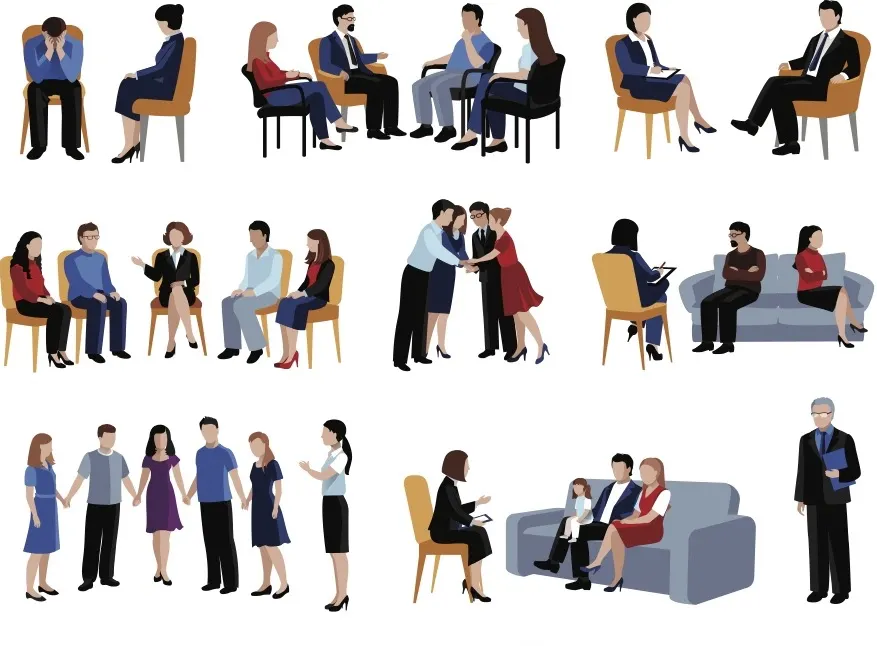What is Psychotherapy?
Psychotherapy is a form of talk therapy that can help you understand your thoughts, feelings, moods, and actions. It is one of the many therapeutic approaches that are in use today. It does that by helping you explore your thought patterns in depth. You learn to deal with problems effectively by bringing your unresolved past conflicts into your conscious mind.
It is used to treat different mental health disorders like anxiety or depression etc. But more than that, it can also help you in managing your daily life stress. Because in today’s day and age, our lives have become so hectic that almost every person is stressed to some extent. So if you ever feel like you are unable to cope, you should consult a therapist.
Uses of Psychotherapy
Psychotherapy can help in managing a variety of mental illnesses among other things. Let’s discuss some of them ahead:
Depression and Mood Disorders
Depression is one of those disorders that come hand in hand with low self-esteem and self-worth issues. So in that way, psychotherapy can help in managing all those issues and helping the person slowly get better. Moreover, it can also help in dealing with other mood disorders such as bipolar disorder, etc.
Anxiety Disorders
Psychotherapy can be used to treat various anxiety disorders, PTSD, or phobias. PTSD is a cycle of incorrect thought patterns where a person believes that they are in a dangerous situation when they are in fact not. Psychotherapy can help in slowly making the person realize these facts.
Eating Disorders
These disorders like Anorexia Nervosa, Bulimia Nervosa, Binge Eating Disorder, etc are often caused by the person being stuck in a loop of wrong coping mechanisms. Some causes such as low self-esteem, and societal pressure may lead to changes in food consumption. It can cause more unpleasant feelings and stress. So in this case, psychotherapy had proven to be quite helpful.
Personality Disorders
Psychotherapy has proven to be quite useful in the cases of Dependent personality disorder, obsessive-compulsive personality disorder, or borderline personality disorder.
Addictions
Unhealthy coping mechanisms can lead to addictions like drug abuse, alcoholism, etc. Psychotherapy can help in treating these issues.
Watch: [Psychotherapy]
Other uses of psychotherapy
Some other issues your therapist can help you with are:
- Healing after experiencing grief or a loss
- Stress Management
- Going through a separation or a tough breakup
- Low self-esteem
- Managing interpersonal relationships
- Managing your life around a chronic illness
- Getting a greater understanding of self
- Improved communication skills

Types of therapy
Therapy can be given in a few ways depending on the problem you might be facing and the things you want to work on. It could be in the form of:
Individual therapy: These are individual one-on-one sessions that would provide complete privacy to the client.
Group therapy: At times, supports groups can be quite helpful for instance; if someone is dealing with addiction, it makes them feel that they are not fighting that battle alone.
Marital or Couples therapy: As humans, we continue to grow and change. Sometimes, those changes and differences can take a toll on our relationships. In that case, it is better for a couple to approach couples counseling.
Family therapy: Family therapy also focuses on resolving family conflict that stems from individual differences. At times our families can act as trigger points for our issues which we can resolve through effective communication.
Approaches in Psychotherapy
Let’s discuss ahead some of the widely used approaches taken in psychotherapy:
Acceptance and Commitment Therapy (ACT)
This approach is mainly based on accepting our negative thoughts and feelings which we mostly tend to avoid. The main idea behind this approach is that acceptance makes you more flexible. It gradually helps you in committing to healthy constructive activities. It can include mindfulness exercises to promote healthy thoughts, feelings, and memories.
To learn more about ACT, check out our next article: Acceptance And Commitment Therapy: A Brief Overview
Cognitive Behavioral Therapy (CBT)
This approach helps you in understanding your incorrect patterns of thinking, feelings, and behaviors. It can help you in changing your unhealthy behaviors into healthy ones. It can help in treating phobias, depression, addictions, and anxiety.
For instance: A phobia is a learned behavior. If as a child, a person was bitten by a dog, they may develop a phobia of dogs. The best way to cure this specific phobia is either through exposure therapy or CBT.
Dialectical Behavioral Therapy (DBT)
This type of CBT helps you in learning behavioral skills. It basically covers two opposite elements of therapy i.e “acceptance” and “change” to make DBT more effective. It helps you in changing your unhealthy behaviors. DBT helps in enhancing some of your life skills such as distress tolerance, emotional regulation, mindfulness, and interpersonal communication.
For instance: If a person has Borderline Personality Disorder, it can help in managing their self-destructive behaviors or suicidal thoughts. Or if they have severe anger issues, then DBT can help them regulate their emotions and increase their tolerance.
Psychodynamic Therapy
This approach focuses on the influence of the unconscious mind on behavior. The idea behind it is that the root of all disorders starts from the early ages of one’s childhood. Some of the techniques used in this approach are catharsis (the process of releasing strong or repressed emotions) and free association (to let out genuine, free thoughts without any censorship. It doesn’t matter if they are coherent or not).
For instance: If a person has a social anxiety disorder (SAD), then psychodynamic therapy seeks to find and resolve underlying tensions that can cause the condition. Your therapist will work with you to identify the specific issues from your childhood that may be contributing to your social anxiety.
Interpersonal Psychotherapy
It focuses mostly on helping you deal with conflicts in your interpersonal relationships. It addresses the issues you are facing in your current relationships and helps you in learning effective communication.
For instance: If a person has relationship conflicts or has just gone through a loss, interpersonal therapy can be quite useful in those cases.
Supportive Psychotherapy
Through this approach, your therapist will strengthen your ability to handle stress and other difficult situations. Furthermore, it also works on increasing your self-esteem. It can include other complementary types of therapies like:
Animal-assisted therapy: Keeping a pet like a dog, cat, or another animal can help ease feelings of anxiety and depression.
Art and music therapy: It can allow you to express yourself, handle anxiety, and develop healthy self-esteem.
How to get the right therapy?
You can get therapy from various mental health-trained professionals such as psychotherapists, clinical psychologists, psychiatrists, licensed social workers, family therapists, marriage counselors, etc.
So approach your primary care physician who can then refer you to suitable mental health services. Or you can also find your local therapist. It is important that your therapist’s goals can align with your goals. If you feel stuck and think that nothing is getting better. Talk to your therapist about it. They might be able to change the approach of therapy in order to better suit your needs.
We hope you found this article useful in understanding the overview of psychotherapy.
Learn about Regression Therapy: Understanding Its Benefits, Techniques, And Risks



 All you need to know about Dialectical Behavioral Therapy DBT
All you need to know about Dialectical Behavioral Therapy DBT  How can CBT help in effectively dealing with ADHD?
How can CBT help in effectively dealing with ADHD?  Understanding Existential Depression
Understanding Existential Depression  Obsessive-Compulsive Disorder (OCD) Treatment
Obsessive-Compulsive Disorder (OCD) Treatment